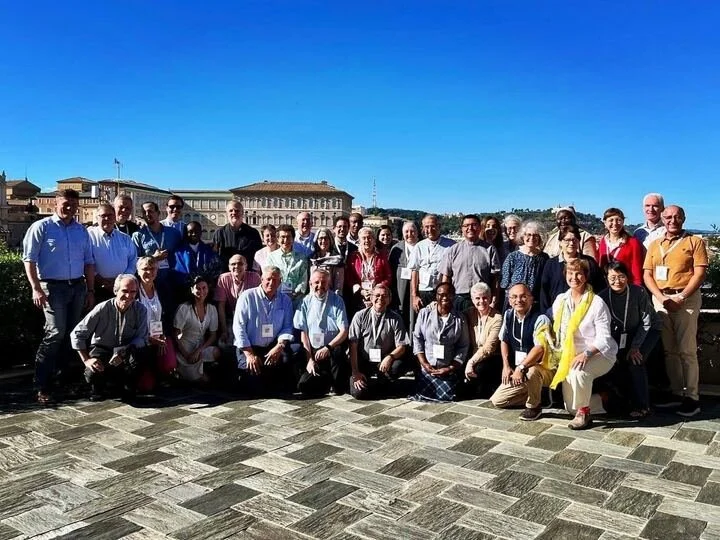Avril Baigent invited to be Synod facilitator in Rome
The second session of the 16th Ordinary General Assembly of Bishops will be held in October 2024 and has as its theme "For a synodal Church: communion, participation and mission”.
Avril Baigent, our Co-Founder and Director, has been invited to be a facilitator for the session as part of her work with the School for Synodality, and the Diocese of Northampton. We are thrilled she will be working so closely on the synodal process with participants from around the world, and we caught up with her as she makes final preparations.
Image credit: School for Synodality
Avril, we are thrilled you have been invited to support the second session. How does it feel as you begin your month in Rome?
Exciting, but very daunting! At the School for Synodality we often say that no topic is too big for a synodal conversation, so it will be amazing to see the global church reflecting on our future together. I’m fascinated to see how conversation in the Spirit works as we move to the next steps of the three year Synod process.
How did this opportunity come about? What previous experiences do you bring to the table?
I was the Synod Co-Lead in a diocese where our Bishop truly believes in synodality as living out the promise of the Second Vatican Council. We went on to have a Diocesan Assembly, and my role now involves helping local Catholic communities to discern their future together. At the same time, Chris and I set up the School for Synodality so that everyone could have the opportunity to take up this Spirit-filled way of being Church.
What aspects are you most looking forward to?
Most of the facilitators were here last year, so are a lot more experienced than I am. I am really looking forward to learning from them, and improving my practice. I am also very excited to hear about synodality in the global church, as the Assembly brings together people from just about every country in the world. I’m wondering what we can learn from communities where listening and discerning are more widespread than in our more parliamentary culture of winners and losers.
What do you feel are the skills needed for good facilitation in this context?
Firstly, a need to step away from my own opinions and put myself at the service of the Holy Spirit in working with the group. Then an ability to listen prayerfully and attentively – not only to what people are saying, but how they are saying it, and what collective discernment is emerging from the conversation. Finally, I think we have not to be afraid of dissenting voices, but to hear those as part of the whole.
You’ve observed the synodal process from the outside, and now you’ll be right up close to the action. What are the common myths you are hoping to debunk?
One of the criticisms that people in the UK often have of synodality is that it is very white and middle class, and that it excludes a lot of people. In a global context, there are stories of how synodality is transforming the African Church, how the Latin American Church are already experts at this, and that Papua New Guinea is a place where synodality is really understood. If we stop talking about it as meetings, and reframe it as a time where everyone’s voice can be heard, it stops being exclusive.
How can we support you during this time?
Please pray for me, and for all involved in the Synod process. This is a real moment of opportunity in the Church, where the Holy Spirit is leading us to new missionary forms of community and participation. I pray that we can trust where the Holy Spirit is leading us, and take those next steps in faith.
The team of facilitators for the second session of the 16th Ordinary General Assembly of Bishops. (Image credit: School for Synodality)


